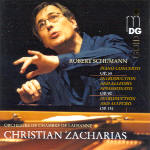The principal problem with Christian Zacharias’ conducting of the Schumann concerto is this: he can’t do it. This in turn raises the issue of the extent to which he has shaped his “interpretation” around his perceived necessity to wave his hands around at the band (which doesn’t seem to be paying much attention in any event). His ineptitude as a conductor, in a general sense, becomes quite obvious in comparison with just about any other version of the work, but for argument’s sake I chose three of my favorites: Ivan Moravec on Supraphon with Vaclav Neumann, Rudolph Serkin with Ormandy on Sony, and Martha Argerich with Harnoncourt on Teldec. These are very different performances, as you can probably imagine, but they all have two things in common: (1) incomparably finer orchestra execution; (2) in the outer movements they gain in energy as the music proceeds to the end of the exposition sections. With Zacharias it’s just the opposite: whenever the piano and orchestra play together they get progressively slower and heavier. His finale, in fact, is one of the lengthiest ever: even a famously “slow” performer like Arrau takes less time in both of his stereo recordings. And the very fast middle movement underplays its lyricism while failing to provide a sufficient point of rest between the two surrounding allegros.
Ordinarily, it’s never wise to make an issue over absolute tempo. What matters more is rhythm and phrasing. And that’s where Zacharias’ two roles as soloist and conductor clearly come into conflict. Take the famous second subject (in duple-time cross-rhythms) of the finale. It’s a tricky passage because the orchestra begins while the soloist is completing his previous phrase. Executed in tempo (as specified in the score), the result sounds cohesive, energetic, and refreshingly contrasted. Zacharias can’t do it. Instead, he imposes a huge ritard on the three chords leading to the top of the phrase, slithers down the keyboard while the orchestra waits for him, and comes out of the transition even more plodding then before. The music actually sounds crippled rather than graceful. Moreover, whenever Schumann repeats this connecting link, Zacharias makes the same mannered gesture. Not only does this (along with the overpedalled, mincing main theme) sap the movement’s energy, it makes his “interpretation” predictable and dull.
Time after time, Zacharias weakens phrase endings, pulls back climaxes, and otherwise gets his hands off the keyboard faster than he should. Similar problems afflict the two other works: a complete inability to sustain momentum over the span of an entire movement, inept handling of transitions, and unpersuasive, affected shaping of solo passages. If you believe this sort of manhandling to be somehow “expressive”, then just compare the way Moravec colors and inflects a musical line without breaking its back rhythmically or stopping the work dead in its tracks.
The timbre of the Lausanne Chamber Orchestra also lacks character. The strings sound grainy and play at basically one mezzo-forte dynamic. Brass and timpani hardly exist. Where are those descending horn calls under the piano trills at the end of the concerto finale’s exposition? Don’t give me any bull about this being a “chamber music” approach. The chief characteristics of chamber music are clarity, subtlety, and nuance, qualities in short supply here. MDG’s recorded sound is very close to the soloist, somewhat airless, and doesn’t solve the various balance problems that crop up regularly. There may be people who enjoy this reading for its “differences” from other versions. I strongly suspect that on repeated listening, what may at first sound like interpretive insights will reveal themselves for what they are: the fussy and mannered reactions of a would-be pianist/conductor to a situation in which he’s clearly overmatched, and under equipped. [6/17/2001]
































